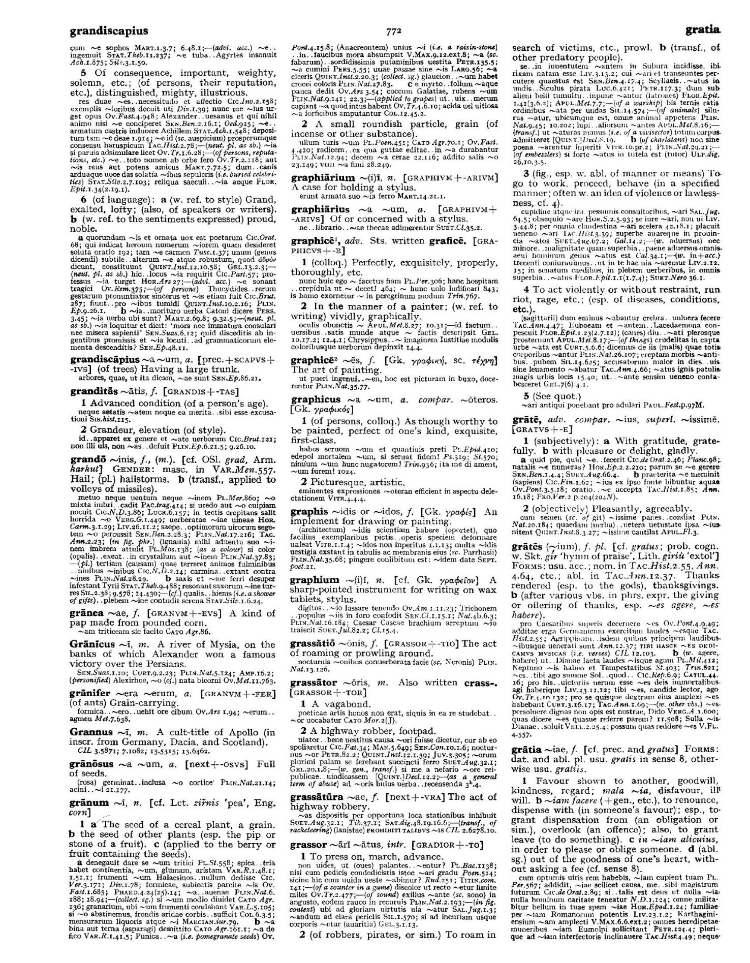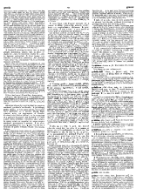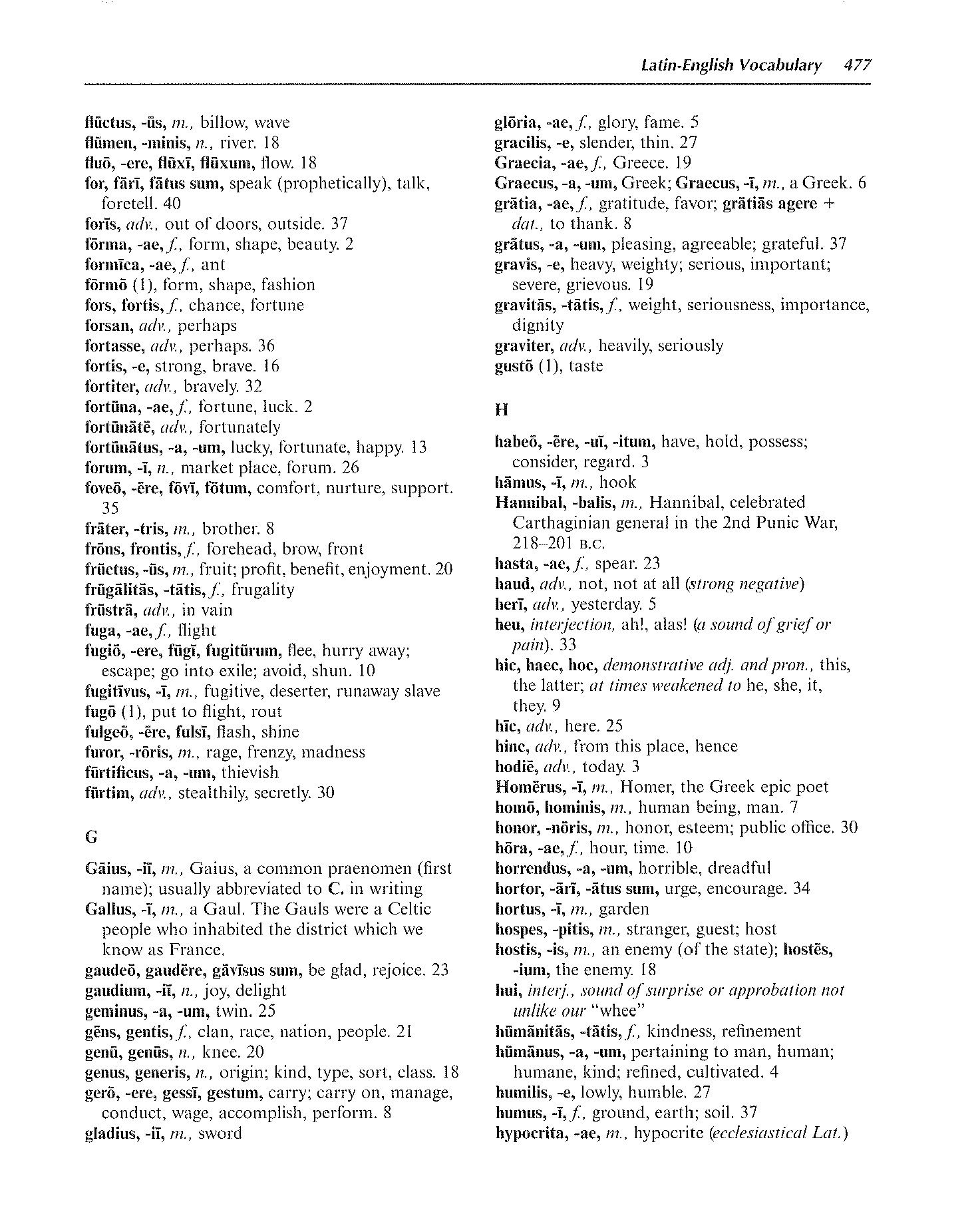
page_listing.tpl
page_subListingDetails.tpl
sub_listingDetails_style1.tpl
sub_listingDetails.title.tpl
grātia favor
grātia is a Latin Noun that primarily means favor.
Definitions for grātia
Wheelock's Latin
Noun
- 1
gratitude, favor
Oxford Latin Dictionary
Noun
- 1
Favour shown to another, goodwill, kindess, regard; mala ~ia, disfavour, ill will. (b) ~iam facere (+gen., etc.) to renounce, dispense with (in someone's favour); esp., to grant dispensation from (an obligation or sim.), overlook (an offence); also, to grant leave (to do something). (c) in ~iam alicuius, in order to please or oblige someone. (d) (abl. sg.( out of the goodness of one's hear, without asking a fee (cf. sense 8).
- 2
Goodwill existing between two or more people, friendship, amity; esp. in phrs. reducere in ~iam. to reconcile; redire in ~iam, to become reconciled. (b) bona (mala) ~ia, friendly (unfriendly) relations; per (bonam) ~iam, bona ~ia, cum (bona) ~ia, in a friendly manner, amicably.
- 3
(in a bad sense) Partiality, favouritism.
Sentences with grātia
Latin to English
Hī centum versūs nōbīs grātiās magnās agunt.Compare These one hundred verses give great thanks to us.
Faciam ... ut aut vīvō mihi aut mortuō grātiās agās.Compare I will see to it that you will give thanks to me either dead or alive.
Magnus tu, Pansa, gratia omnis et habeo et ago debeo.Compare We ought all both to feel and to express the greatest gratitude to you, Pansa.
Vester ipse virtus gratia ago.Compare Give thanks to your own personal valour.
Habeo senectus magnus gratia, qui ego sermo aviditas augeo.Compare I feel great gratitude to old age, which has increased my eagerness for conversation.
Declension table for grātia
Cactus2000
| Singular | Plural | |
| Nom. | grātia | grātiae |
| Gen. | grātiae | grātiārum |
| Dat. | grātiae | grātiīs |
| Acc. | grātiam | grātiās |
| Abl. | grātiā | grātiīs |
Data sources
Notes
- Definitions
- Frederick M. Wheelock, Wheelock's Latin, 6th ed., rev. Richard A. LaFleur (New York, NY: HarperCollins Publishers, 2005): 477.
- P. G. W. Glare, Oxford Latin Dictionary, Vols. 1-8 (Oxford: Clarendon Press, 1982): 772.
- Word frequencies
- Christopher Francese, "Latin Core Vocabulary," Dickinson College Commentaries, last modified 2014, http://dcc.dickinson.edu.
- Paul B. Diederich, The Frequency of Latin Words and Their Endings, PhD diss., (Columbia University, 1939).
- Louis Delatte, Suzanne Govaerts, Joseph Denooz, and Etienne Evrard, Dictionnaire fréquentiel et index inverse de la langue latine [Frequency Dictionary and Inverse Index of the Latin Language] (Liège, Belgium: Laboratoire d'analyse statistique des langues anciennes de l'Université de Liège [L.A.S.L.A.], 1981): 121.
Bibliography
Allen, Joseph H. Allen and Greenough's New Latin Grammar for Schools and Colleges: Founded on Comparative Grammar. Edited by James B. Greenough, George L. Kittredge, Albert A. Howard, and Benjamin L. D'Ooge. Boston, MA: Ginn & Company, 1903.
Crystal, David. A Dictionary of Linguistics and Phonetics. 6th ed. Oxford, UK: Blackwell Publishing, 2008.
Delatte, Louis, Suzanne Govaerts, Joseph Denooz, and Etienne Evrard. Dictionnaire fréquentiel et index inverse de la langue latine [Frequency Dictionary and Inverse Index of the Latin Language]. Liège, Belgium: Laboratoire d'analyse statistique des langues anciennes de l'Université de Liège (L.A.S.L.A.), 1981.
Diederich, Paul B. The Frequency of Latin Words and Their Endings. PhD diss., Columbia University, 1939.
Francese, Christopher. "Latin Core Vocabulary." Dickinson College Commentaries. Last modified 2014. http://dcc.dickinson.edu/latin-vocabulary-list.
Gildersleeve, Basil L., and Gonzales Lodge. Gildersleeve's Latin Grammar: Third Edition, Revised, and Enlarged. 3rd ed. London, England: Macmillan and Co., 1903.
Glare, Peter G.W. Oxford Latin Dictionary. Vols. 1-8. Oxford, England: Clarendon Press, 1982.
Krüger, Bernd. "Latin Conjugation Tables." Cactus2000. Accessed May 5, 2023. https://latin.cactus2000.de/index.en.php.
Pierson, Nick. "Sound of Text." Accessed October 26, 2019. https://soundoftext.com.
Wheelock, Frederick M. Wheelock's Latin. 6th ed. Revised by Richard A. LaFleur. New York, NY: HarperCollins Publishers, 2005.
Wiktionary Contributors. "Victionarium." Wikimedia Foundation, Inc. Updated March 18, 2019. https://la.wiktionary.org/wiki/Victionarium:Pagina_prima.
Citation
Chicago (17th ed.)
Allo Contributors. "grātia, grātiae (n.) - Latin Word Definition." Allo Latin Dictionary. Last modified . Accessed February 19, 2026. http://ancientlanguages.org/latin/dictionary/gratia-gratiae.
Entry created on . Last updated on .








